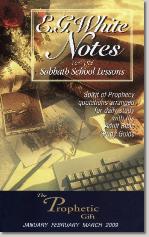|
||||||||||||||||||||
Commentary on "Spiritual Gifts and Prophecy"
Day 5: Wednesday, January 14, 2009
The lesson first introduces some prophecies that came true even though the people making the predictions shared little with Biblical prophets. It then follows that testing a prophet by the accuracy of his predictions is not a valid way to discern whether the prophecies are from God. Then the lesson declares that the Bible teaches us that prophets and prophecies play an important part in salvation.
The lesson ends with a list of the purposes of the gift of prophecy.
The E.G. White Notes corresponding to this lesson include the following quote:
“I would call especial attention to the remarkable dreams given in this little work, all with harmony and distinctness illustrating the same things. The multitude of dreams arise from the common things of life, with which the Spirit of God has nothing to do. There are also false dreams, as well as false visions, which are inspired by the spirit of Satan. But dreams from the Lord are classed in the word of God with visions. Such dreams, taking into account the persons who have them and the circumstances under which they are given, contain their own proofs of their genuineness. Testimonies, vol. 1, pp 569, 570.
Problems
First, the quote from the E.G. White Notes needs to be addressed. The last sentence is our focus. Two “proofs of genuineness” of dreams are given: 1) the person, and 2) the circumstances. That is it. We don’t need to look at the Biblical tests of a prophet! The Bible says:
"And if you say in your heart, 'How may we know the word that the Lord has not spoken?'--when a prophet speaks in the name of the Lord , if the word does not come to pass or come true, that is a word that the Lord has not spoken; the prophet has spoken it presumptuously. You need not be afraid of him" (Deut. 18:21, 22).
The lesson’s examples of false prophets with true prophecies is not the issue. The Bible test is not our looking at predictions that come true, but on checking for the ones that don’t happen. Nowhere does the Bible suggest that our tests are to look at the person and his/her circumstances. This new method of testing a prophet will no doubt serve the lesson writer well, in a future lesson, as he introduces Ellen G. White as a true prophet, even though several of her prophecies failed to occur.
Finally, we must focus on the statement made by the lesson writer that prophets and prophecies play an important part of salvation. The Bible says:
Long ago, at many times and in many ways, God spoke to our fathers by the prophets, but in these last days he has spoken to us by his Son, whom he appointed the heir of all things, through whom also he created the world (Hebrews 1:1,2).
The prophetic role of speaking new truth as the Old Testament prophets did is now superseded by the Lord Jesus. The Bible does not allow for a last-day “messenger” with a message of “present truth” not revealed in Scripture. Jesus is the final Word.
Summary
- The Biblical proof of a prophet is whether his/her prediction fails to occur, not a look at the person or their circumstances, as Ellen G. White states.
- Jesus is the final Word. The Bible does not allow for a last-day “messenger” with a message of “present truth” not revealed in Scripture.
Copyright 2009 BibleStudiesForAdventists.com. All rights reserved. Revised January 13, 2009. This website is published by Life Assurance Ministries, Glendale, Arizona, USA, the publisher of Proclamation! Magazine. Contact email: BibleStudiesForAdventists@gmail.com.


The Sabbath School Bible Study Guide and the corresponding E.G. White Notes are published by Pacific Press Publishing Association, which is owned and operated by the Seventh-day Adventist church. The current quarter's editions are pictured above.
Official Adventist Resources
Standard Edition Study Guide Week 3
Teacher's Edition Study Guide Week 3
Easy Reading Edition Study Guide Week 3
Search the Complete Published Ellen G. White Writings
